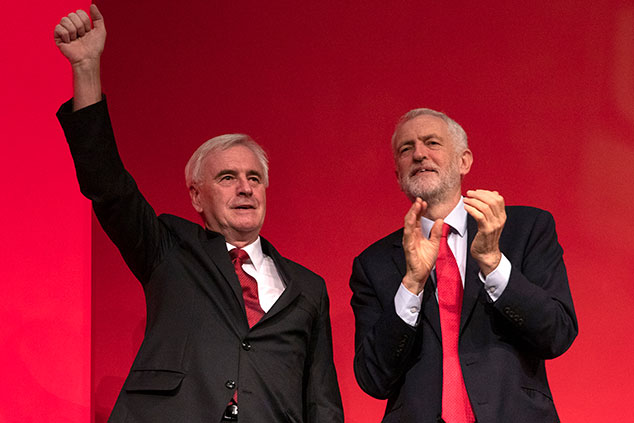
This article is taken from our FREE daily investment email Money Morning.
Every day, MoneyWeek’s executive editor John Stepek and guest contributors explain how current economic and political developments are affecting the markets and your wealth, and give you pointers on how you can profit.
Britain is enduring a much-needed election. You might have noticed.
Since the financial crisis, we’ve got used to elections being all about sackcloth and ashes.
Austerity. Cuts. Taking away your house to pay for your elderly care.
All policies that might be poorly implemented or ill thought through in the first place, but which do involve some nod to the notion that we can’t just stick it all on the credit card forever.
Problem is, voters don’t like that. And eventually, politicians – particularly the more flamboyant sort – cannot help themselves but play to the crowd.
That’s why this election is all about the spending. Which brings us to the latest wheeze – “free” broadband for all!
Have some free stuff – all paid for by taxpayers
This morning, the Labour Party added a chunk of BT to the list of things it plans to renationalise if and when it gets into power.
We’re already looking at renationalised water utilities, railways, National Grid and Royal Mail. Now we’re looking at BT Openreach – the broadband network – too. The goal would be to give everyone in the UK free full-fibre broadband by 2030.
The potential cost of the nationalisation is debated, as it always is. The people who plan to take control of the asset – the Labour Party – say it will cost less than it probably will.
They’ve got the cost of the roll-out at more than £20bn, while the cost of the part-nationalisation would be set by Parliament, and paid for with government bonds.
The people who own the asset – BT shareholders (or at least their representatives, in the form of the management) – say it will cost more than it probably will. At the moment, figures of close to £100bn are being bandied about.
Meanwhile, the cost of maintaining the network will be funded by a new tax on the current public enemy number one, the tech multinationals.
I’m not sure what form this tax will take, given that we’re currently struggling to tax them properly and it’s an issue that lots of clever people have been looking at. But let’s not worry about the details right now.
So what’s the upshot of all this? The upshot is you get a load of brief headlines about “free broadband”, as though the minute a Labour government gets into power, your Wi-Fi will suddenly be a lot better and also free of charge.
And being cynical about it – as you should be – that’s the point.
Look, I’m entirely open to talking about the best way to own and run aspects of the economy. The “private vs public” ownership debate is frequently couched in overly simplistic terms, with one being bad and one being good depending on which side of the political fence you’re on.
But this isn’t being driven by finding the best solution to a tricky set of problems. It’s being driven by ideology and the ability to promise “free” stuff ahead of an election. That’s it.
As the FT notes, “Mr McDonnell said that this latest nationalisation was ‘the limit of our ambitions’”. However, as the paper also adds, that’s exactly what he said in July after Labour talked about nationalising the water companies. To wit: “This is the limit of our ambition when it comes to nationalisation.”
It’ll be interesting to see just what else we’re told we can get for “free” in the next few weeks.
Make sure you have a Plan B
From an investor’s point of view, the main question here is: how likely is this to happen?
At the moment, according to the polls, the answer to that is “not very”. That’s presumably why BT’s share price has recovered relatively quickly from an early panic-spike lower.
Of course, as we all know, polls may not reflect what happens on the night. So what can you do about it?
Realistically, anyone holding BT at the moment has to be aware that it’s not exactly a company without its troubles.
So if you were still happy enough hanging on through the stock (and I’ll warn you that I haven’t done enough research into BT itself to give you a high-conviction view on it as yet), then I’m not sure this added threat should make a lot of difference to your investment case.
As for the wider risk of a Labour government – all that this BT plan demonstrates is that the current manifesto is just the tip of the iceberg.
A few investment banks persuaded themselves a month or so ago, that a Corbyn government would be less of a risk than a “no deal” Brexit. Their idea was that Corbyn’s bark would be worse than his bite. That when in power, the courts or reality or coalition partners would act as restraints on his ambitions to roll back capitalism.
Even if we put aside the fact that “no deal” Brexit appears to be pretty much off the table now, that now surely seems terribly naive.
I suspect that we won’t get a Corbyn government next month. However, if we do, investors need to understand that they cannot take their property rights for granted. And that means having some sort of plan – right now – for your most vulnerable assets.
We’ve looked at this several times in MoneyWeek magazine over the last few months. If you’re not already a subscriber you can get your first 12 issues for £12 here.
Also – don’t miss our all-day Wealth Summit. It’s next Friday. If you haven’t booked your ticket yet, hurry – the last few are going fast!